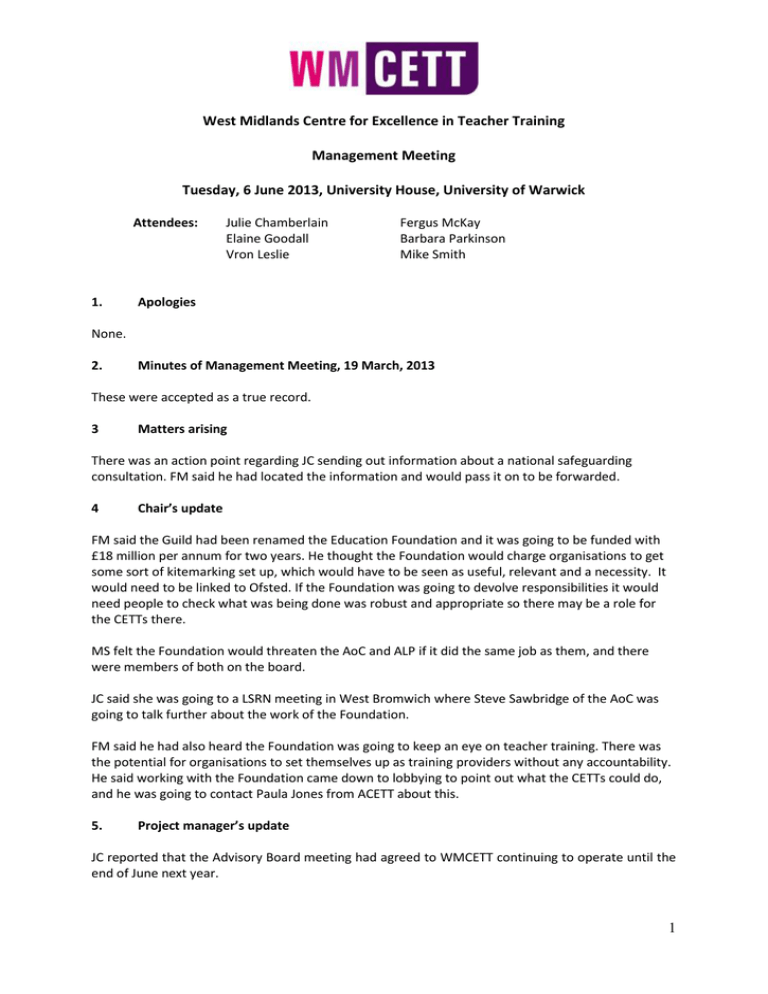West Midlands Centre for Excellence in Teacher Training Management Meeting
advertisement

West Midlands Centre for Excellence in Teacher Training Management Meeting Tuesday, 6 June 2013, University House, University of Warwick Attendees: 1. Julie Chamberlain Elaine Goodall Vron Leslie Fergus McKay Barbara Parkinson Mike Smith Apologies None. 2. Minutes of Management Meeting, 19 March, 2013 These were accepted as a true record. 3 Matters arising There was an action point regarding JC sending out information about a national safeguarding consultation. FM said he had located the information and would pass it on to be forwarded. 4 Chair’s update FM said the Guild had been renamed the Education Foundation and it was going to be funded with £18 million per annum for two years. He thought the Foundation would charge organisations to get some sort of kitemarking set up, which would have to be seen as useful, relevant and a necessity. It would need to be linked to Ofsted. If the Foundation was going to devolve responsibilities it would need people to check what was being done was robust and appropriate so there may be a role for the CETTs there. MS felt the Foundation would threaten the AoC and ALP if it did the same job as them, and there were members of both on the board. JC said she was going to a LSRN meeting in West Bromwich where Steve Sawbridge of the AoC was going to talk further about the work of the Foundation. FM said he had also heard the Foundation was going to keep an eye on teacher training. There was the potential for organisations to set themselves up as training providers without any accountability. He said working with the Foundation came down to lobbying to point out what the CETTs could do, and he was going to contact Paula Jones from ACETT about this. 5. Project manager’s update JC reported that the Advisory Board meeting had agreed to WMCETT continuing to operate until the end of June next year. 1 She had been supporting VL with admin work for the Teaching and Learning Coach programme, and Clever Elephant with work on the Changing the Dynamics project. JC was now working on arranging the final event in that project, for 27 June, and also putting together the final report for LSIS, which had to be in by the end of June. She was also starting to prepare a newsletter to go out in July. 6. Current activities VL – talked about the latest work of being an LSIS Hub for the Teaching and Learning Coach Certificate Programme. Ten people had already completed the refresher programme. FM asked about the people who took that training and VL explained they were people at different levels. Dudley College had already run its own programme for teaching and learning coaches. As a Hub the CETT had the responsibility for externally moderating any programme within the region. There had been some brilliant feedback from colleges running the programme, and she said that made it even more frustrating that it did not seem likely it would carry on. Out of the trainees some were very experienced and some had not done anything like this before. To get their advanced certificate they had to cascade the training. VL had asked Rose Moorse of LSIS to do some informal internal moderation and she said the level students were working at was high. Three students’ work had to be internally moderated by WMCETT, and then there would be external moderation with EMCETT and EECETT on July 4. FM thanked VL for her had work on the project and said it would be good to carry it forward. VL said several of the organisations involved wanted to set up groups to train. VL said there was a discussion about whether people who wanted to do the programme would pay for themselves, or whether their colleges might pay. They would need to pay for the moderation and certification. Colleges which had been involved in this project had seen the value. MS said this was the sort of thing that was going to fold by default. The CETT should lobby Steve Sawbridge to say it should carry on. EG – talked about the new teacher training qualifications, and said some were identical and some almost identical. The DTLLS-type qualification was only going to be offered at Level 3 not 4, and there was no mention of roles people played. The certificate was just a practical teaching course and the diploma was practical with theory and a wide teaching brief. The real difference was it was up to the individual or employer to decide what they wanted. VL asked how qualifications would APL over. EG said only three credits would be able to APL into the certificate programme. There had been instructions to de-nest the qualifications and the PTLLS would not be at the front of the diploma qualifications but there had to be something there as an introduction to teaching. The idea was you could come in at any entry point. One problem was that there was no guidance about what people should do about what they had got already, such as if they have got a PTLLS whether they have to do any particular unit. EG said what had been discouraging was that she could not run the fast-track programme because courses had to be more than a year. MS said the only thing about people not doing the higher level courses, would be what happened when Ofsted went in. EG said they only looked at staff qualifications when the teaching and learning slipped. VL said surely colleges would still want staff to have the diplomas. EG said the thought was managers in colleges held the view that Level 4 would be fine. 2 VL pointed out if people wanted to teach in schools they would have to do it to get QTLS. EG said the plan was to keep QTLS because the government wanted to keep the lead into schools for vocational staff. What was being proposed was that QTLS would be achieved after finishing qualifications, and the person then did their probationary year, so there was almost professional formation built into it. EG said there had been a long wait to get the ok from the university on the certificates, and it needed to be linked up with training providers. There needed to be conversations with them as there had been with the CBED course about what they wanted but there was not much time for this. MS suggested using Survey Monkey software, and EG said it could be done with a survey link. EG said she wanted to include some support for people in WBL who might want to go in at Level 4-5 but might not feel very confident in their skills, and she wanted to consult with people about what they thought those barriers might be. Her guess was that it would be about writing and study skills. There was a plan to set up two two-day introductory courses, one on site and one at the university. MS – said that Learning and Enterprise Partnerships were the flagship economic rejuvenators of the country and were being substantially financed. The Midlands had done well, with £1.8 million going to the Marches, £1.2 million to Worcester and £7.8 million to the Central Birmingham area. It was pump-priming to develop a response to the austerity of the current situation. MS said one of the big priorities was the skills agenda, and each LEP had to come up with their own skills strategy and he thought there could be a big role there for the CETTs. The boards were putting money into employers to train their staff and they could do it in house or buy in the training. MS said he was trying to put together a framework for big employers to set up a mentoring scheme for them to look at how they deliver in an internal training programme which is accredited. He said organisations were buying in outside resources, but it was more effective to do it internally. MS felt there was a lot of potential in setting up a development programme for employers who wanted to set up their own training schemes. It could be a like a very large action research project, and build on SLC coaching as well. FM said the LEP had approached CLL about helping develop a skills agenda, so there may be a way in to talk to them. BP said a lot of smaller employers in the Third Sector had stopped sending people out for training and would prefer to have it on site. FM said some of the smaller organisations were creating alliances with other organisations and he suspected there would be different models out there. MS said the mentoring could include a check of what people had, and what they needed to buy in. There could be a programme that pursued a needs analysis and looked at what qualifications their teachers needed. There would still be a role for the colleges and training providers. MS said he would like to put together a framework for this by the autumn, and look at what sort of interest there might be and what sort of funding might be available from BIS and the LEPs. BP asked if it would have to go different LEPs. MS said he thought Prof Ian Oakes would be very interested in it, and it could be something ACETT could roll out to the other CETTs. BP – talked about the Changing Dynamics project. The first stage had involved talking to the FE colleges and Third Sector infrastructure organisations in four areas. The second stage was bringing those people together in the areas and facilitating an Active Dialogue. The third stage was writing those four areas up into case studies and developing a spectrum of co-work and engagement. 3 The key findings had involved the different circumstances in different areas, such as a college in special measures and a voluntary sector organisation which had not had a chair for six months. There were also different levels of understanding from very good to none between the different sectors. BP said if you talked about FE and the Third Sector infrastructure bodies both had the learners at heart and the same ideas about inclusivity etc, but they delivered in such a different way they didn’t have a common agenda. There were huge cultural differences in how they functioned, and people were still in ‘silo’ thinking. There was more work to be done to overcome these barriers to reach mutual trust and respect. There were differences of perception, and no synergy. The four areas were very different, with one at the beginning of a relationship and hopeful and optimistic about what they could do. Another had a lapse of engagement because of missing personnel, and the college was very keen to develop a relationship, and had a lot of apprenticeships they wanted to set up. At another they have a very traditional relationship of funder and fundee and some people wanted to change the nature of it. Another one was really trying to make some inroads. BP said the project was getting feedback as to whether people had benefited from this process. One principal said it was very useful and timely. People were being asked to come up with key actions. The event on June 27 had originally been planned as a dissemination event but it had been changed to an Active Dialogue as it was thought as the case studies were going to be anonymous it would be too difficult to make it about dissemination. FM said reports produced should go on the Excellence Gateway but it was not known who would manage this. JISC were talking about taking control of it but there were concerns about whether they would be able to manage it. 7 Any other business EG said this would be her last meeting as she was retiring. FM paid tribute to her work for WMCETT, for keeping the committee informed about developments, and for making sure the skills agenda was taken seriously right across the Midlands. 8 Next meeting The date for the next meeting was set for Thursday, September 19 at 10.30am, at University House, University of Warwick, room number to be confirmed. 4








